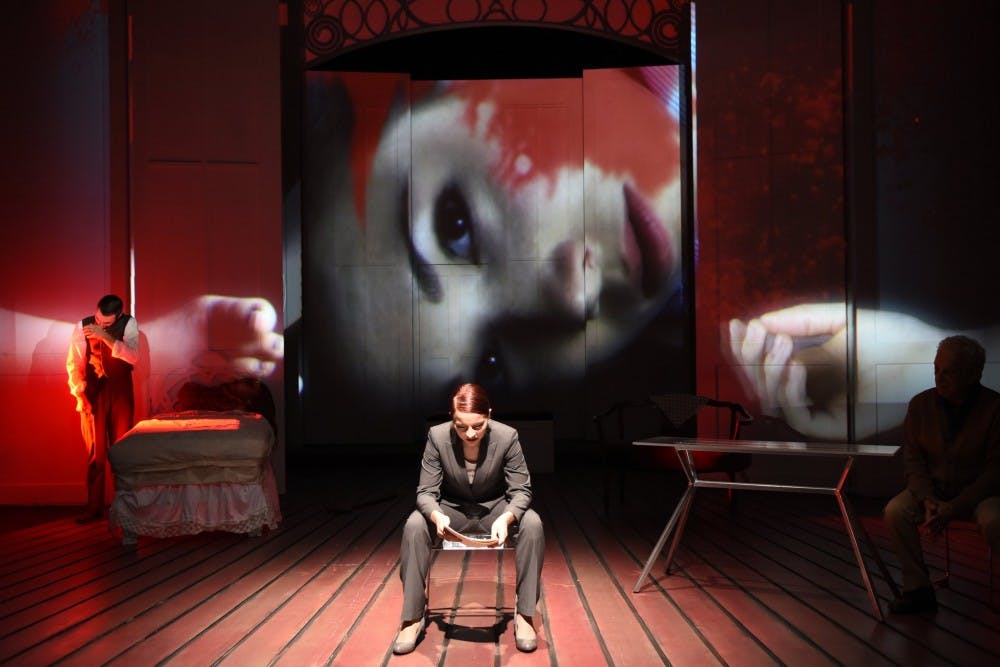Each person is defined by their identity, an identity that changes and reflects onto others.
But in the digital age, an identity is easier to fabricate than ever before. What can happen if it goes unchecked?
This question is one of several explored in the sci-fi crime drama, “The Nether” by Jennifer Haley. Since premiering in March 2013, the play has shown across the world, but the latest performance was conducted by students of ASU's School of Film, Dance and Theatre.
The play uses a virtual world to discuss human imagination, centering on a young detective who interrogates a creator accused of a disturbing deed in this virtual world, according to the ASU events page.
Lance Gharavi, an associate professor in the School of Film, Dance and Theatre, said the performance was the culmination of planning and rehearsals that go back to March.
After Dallas Nichols, a third-year MFA student in the interdisciplinary digital media program, proposed the play to Gharavi last fall, preparations began.
“We try to do works that are going to be of interest to students, the communities we’re embedded in,” Gharavi said.
Gharavi said the play was a “very contemporary work that engages with familiar ideas” and the allure of digital ideas. The decision to include the play in the performance schedule was influenced by the possibilities that exist in digital communities, he said.
“We want to do things that are going to be relevant to where and when we exist," he said.
Audrey Pfeifer, a junior majoring in theatre, said that most viewers have found the show to be educational because it sparks a discussion on a topic that is relevant and heavy.
“Some focus more on the surface themes,” Pfeifer said. “It’s more of a commentary than entertainment.”
Pfeifer said that acknowledging the play as a commentary on digital identities will help viewers be better prepared for its content.
William Partlan, the play director and an associate professor in the School of Film, Dance and Theatre, said the play is highly relevant to student audiences who are facing a world that is undergoing climate change. The world is increasingly relying on the internet and virtual reality to educate and entertain the population, he added.
“The University is an important place to encounter and discuss these issues,” Partlan said, “and certainly ASU, as a leader in sustainability and in online education, is an ideal site to engage in this exploration."
The play dramatizes difficult issues around sexual violence in the virtual world. Partlan said the School of Film, Dance and Theatre was careful to make sure that any issues raised by the play that might trigger audience trauma could be addressed in appropriate and private ways.
They provided student resources like relevant information and contacts and a safe place to decompress in the lobby. They also included a link to a video of Tiffany Ana Lopez, the Director of the School of Film, Dance and Theatre, discussing how to deal with any potential traumatic effects of experiencing the production.
“The issues raised in the play concerning the ethics of online behavior, addiction to virtual reality, climate change and its potential future effects, etcetera, were discussed by the audience with me and the designers and actors,” Partlan said.
While the play touched on sensitive subjects, Pfeifer credits the actors’ willingness to perform under Partlan’s direction.
“He would ask us if we're comfortable doing things on stage and set up a safe environment,” she said. “I don’t think I could have done this without a director like him.”
Pfeifer described the rest of the cast as fantastic, friendly and fun to be around. Everyone helped to create a safe environment, and even if the themes were problematic, the performers still found enjoyment in putting on a show, she said.
She described one of the characters as having good intentions, but not good means, and to fully understand them you have to understand their motivation.
This notion led to her own self-discovery.
“My personal identity has changed, I have kind of gained an open mind,” Pfeifer said. “I feel I’ve gained an understanding.”
The play opened at ASU’s Lyceum Theatre on Oct. 13 and ran for two weeks. Gharavi said the reception has been positive and that audiences have understood what they've seen.
The feeling of success may not linger for long as the students immediately begin planning and rehearsing their next performance, a process Gharavi said is extraordinary demanding and fast paced.
“It is their passion and their curiosity that drives them forward often to exhaustion,” Gharavi said. “If they didn’t enjoy, I don’t think they wouldn’t do it.”
Reach the reporter at cmbegaye@asu.edu and follow @Hoagmaster91 on Twitter.
Like The State Press on Facebook and follow @statepress on Twitter.




